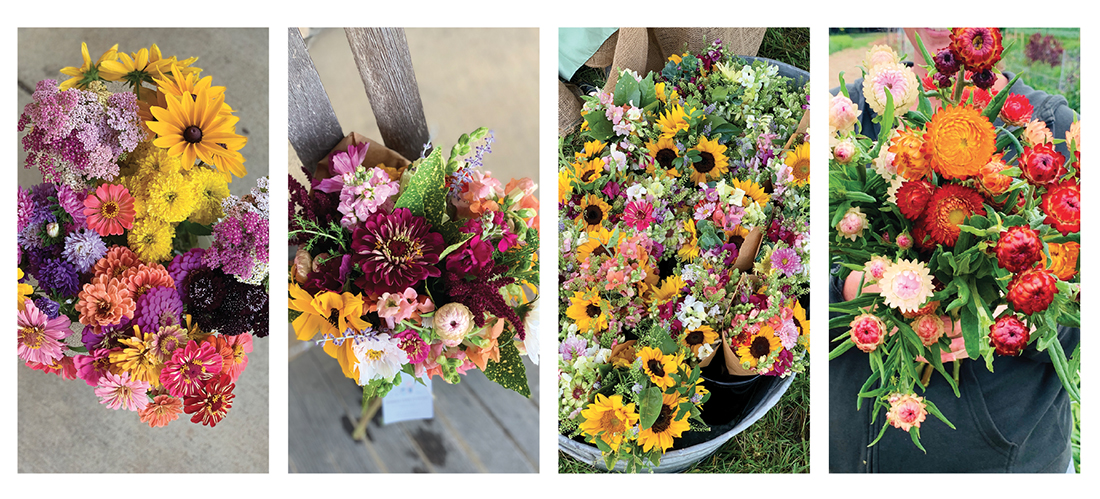
Flower Power
Betting the farm on a budding business
By Maria Johnson
Like a lucky lover who plucks flower petals in a game of “she-loves-me, she-loves-me-not” and ends on a promising note, Elaine Fryar and her family have found that many folks adore the old-fashioned bouquets they make in McLeansville.
The thirst for botanical beauty is encouraging because the Fryars are betting that their billowing arrangements — dense mounds of 20 to 30 stems — will help the family farm survive.
“It’s been something we’ve truly enjoyed doing, as well as being profitable,” says Elaine, 64, who founded Waseda Farm Flowers in 2020 with her adult children, Crystal Osborne and Ricky Fryar.
Together, the family cultivates a half-acre of cutting flowers, brilliant ribbons stitched into 200-plus acres of farmland that have been in the family of Elaine’s husband, Gerald, for more than 100 years.
Waseda Farms — pronounced wah-SEE-duh, a Native American word for “by the pines” — has evolved several times, adapting to the markets of the day.
Gerald’s great-grandfather started with tobacco and grain.
Gerald’s father switched to dairy.
Gerald pivoted back to grain in the early 1970s.
He added turf grass late ’80s, raising tall fescue for sod until the Great Recession of 2008, when the bottom dropped out of the housing market, and therefore the landscaping market.
The family fell back on a cushion of grain — corn, wheat and soybeans — and another income stream: a dairy barn repurposed as a wedding venue, from moo house to I-do house.
The Fryars had overhauled the classic barn for Crystal’s wedding in 2004. On the outside, they veneered the concrete-block first level with stone. They painted the hayloft red and topped the barn with a second metal roof for insulation.
To transform the interior, they milled pines that grew on the farm and used the lumber for handsome paneling, floors, doors, window frames and trim. They installed a full kitchen and HVAC system.
The Fryars rented out the site for weddings from 2005 until 2016, capitalizing on the popularity of rustic nuptials and receptions that are often cheaper and more relaxed than church-and-hall affairs. Sometimes, wildlife provided comic relief during weddings in the field behind the barn.
“We had coyotes and deer to run across,” says Elaine.
About half the couples hired Crystal to provide the floral arrangements. Crystal bought the stems from wholesale growers and arranged them into essays of color and texture, each with bold statement flowers and soft fillers. She spiked them with fragrant lavender and basil.
“We thought it would have been nice to grow the flowers, but there weren’t enough hours in the day,” says Crystal.
The Fryars still raised corn, wheat and soybeans, an enduring operation that today covers about 500 acres, half belonging to the family and half leased from other land owners.
They stopped doing weddings so Crystal could spend more time with her family, but her friends kept asking her to make bouquets for weddings and other events.
As 2020 approached, both Crystal, a preschool teacher, and her brother, Ricky, an electrical and mechanical engineer, wanted to figure out a way join their parents in farming full time.
“It was mostly about wanting to keep the farm going and giving them a chance to slow down if they choose to,” says Crystal.
Eager to ensure a fifth generation of farming Fryars, Elaine, a certified public accountant, jumped on the Internet.
“I spent all winter reading and learning and researching,” she says.
She narrowed the possibilities of lucrative new crops to microgreens and flowers.
“We started messing around with flowers, and flowers won out,” she says, noting that Gerald’s mother and grandmother had once raised and sold flowers as a sideline.
Elaine and Crystal resurrected the business, ordering seeds based on Crystal’s memory of what brides wanted in their bouquets. They culled advice from the Facebook page of “The Gardener’s Workshop,” a business run by flower farmer Lisa Mason Ziegler of Newport News, Virginia.
Elaine rigged a walk-in cooler with grow lights, converting the space to a makeshift greenhouse where they started seeds.
Crystal holds out her phone to show a picture of her 11-year-old daughter London using a wet toothpick to pick up tiny snapdragon seeds and stick them into soil blocks the size of sugar cubes.
As soon as the fields were dry enough — which wasn’t until March — the Fryars transplanted the seedlings outdoors. There, they grew in long rows beside a field of corn, a natural windbreak.
The family hung houses to attract birds that would feed on bugs drawn to the flowers.
To ward off the deer, they raised an electric fence around the rainbow lanes. Elaine tells the story of a woman who ordered bouquets for a wedding shower.
“She said, ‘I want them to be lavender,’ and I said, ‘Well, you’re gonna have to tell me more, because I have about 15 shades of lavender.’ ”
This summer, the family has started seeds in the greenhouse every week. Their goal is to have flowers blooming from April through frost.
Hobby gardeners would recognize some of their 30 varieties, such as cosmos, black-eyed Susans and zinnias. Their grandparents might know the rest, including feverfew, billy balls, strawflower, stock and amaranth, as well as their colorful cousins, which sometimes go by the Latin names denoting genus: Cerinthe, Scabiosa, Didiscus and Bupleurum.
Crystal’s son, Max, 8, ticks off the names with the assurance of an old farmer. He and his sister spend summer mornings cutting flowers and hauling them into the barn, which now serves as a design studio.
Crystal builds most of the bouquets, cinching them with a rubber band, wrapping them in brown craft paper, tucking in a packet of preservative, and slipping them into plastic bags with enough water to get them home.
Most arrangements leave the farm with walk-in customers and subscribers who pay $100 to pick up a fresh bunch of flowers every week for five weeks. Several Waseda customers have given subscriptions as gifts.
Crystal reads a message from a woman who received a gift subscription: “Girl, you are an artist, and I’m unbelievably impressed.”
Elaine quotes a text from another subscriber: “These are the prettiest sunflowers ever.”
The family provides wholesale stems to a couple of local florists, Garner’s on Church Street and Abba Design on North Eugene Street.
The Fryars are taking a break from selling bouquets at the Gibsonville Farmers Market during Covid-19, but eventually they’d like to attend more markets. They’d also like to make a flower truck out of a three-wheeled Italian vehicle called an Ape (pronounced AH-pay), an adaptation of the Piaggio company’s popular Vespa scooters.
“We think there’s a market in neighborhoods,” says Elaine. “Like with food trucks.”
Crystal is experimenting with another revenue generator: “Bubbles and Blooms,” a flower arranging class conducted in the barn’s hayloft at well-spaced tables. Electric fans and champagne provided.
Like most businesses, Waseda has made concessions to the coronavirus, but overall the pandemic has been good for sales, Elaine says. Outbreaks around the world have snipped flower imports into the United States
“It opens up a lot of opportunities for local flower growers,” she says. “I saw pictures from Holland of them just dumping flowers.”
With Americans spending more time at home, many of them are willing to spend more money to beautify their surroundings.
Supplying them with sprigs of cheer is rewarding, says Elaine, who now thinks that retirement isn’t nearly as attractive as pushing out daisies. OH
Waseda Farm Flowers, located at 6298 McLeansville Road, is open Tuesdays and Thursdays from 9 a.m. to 6 p.m. Find them at waseda-farm-flowers.square.site or on Instagram @wasedafarmflowers.





